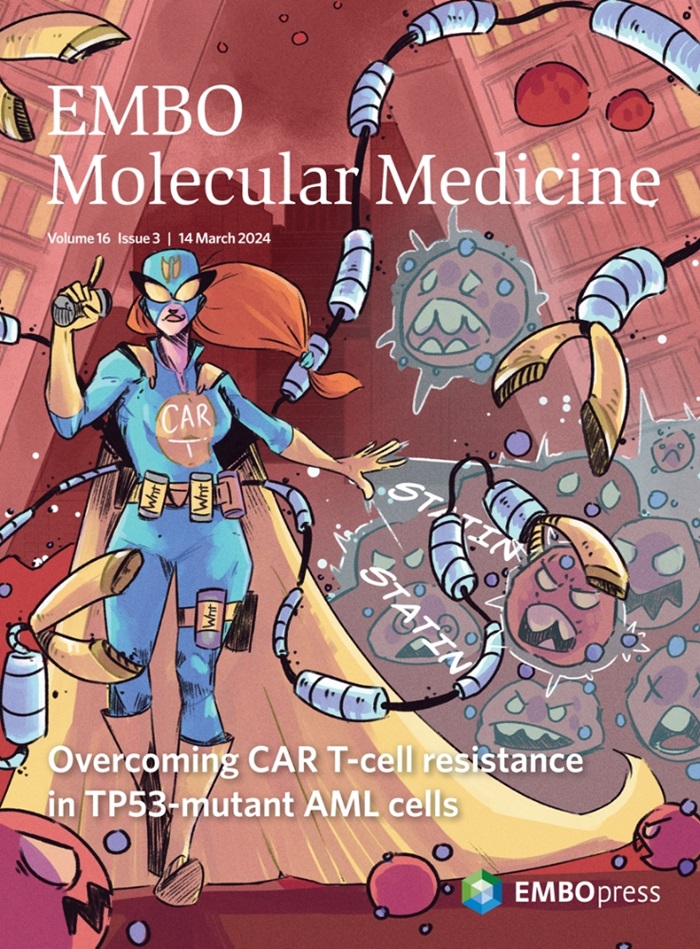AI-identified CD133-targeting natural compounds demonstrate differential anti-tumor effects and mechanisms in pan-cancer models.
IF 8.3
1区 医学
Q1 MEDICINE, RESEARCH & EXPERIMENTAL
引用次数: 0
Abstract
Advanced algorithms have significantly improved the efficiency of in vitro screening for protein-interactive compounds. However, target antigen (TAA/TSA)-based drug discovery remains challenging, as predictions of compound-protein interaction (CPI) based solely on molecular structure fail to fully elucidate the underlying mechanisms. In this study, we utilized deep learning, specifically TransformerCPI to screen active molecules from a Chinese herb compound library based on protein sequences. Two natural products, Polyphyllin V and Polyphyllin H, were identified as targeting the pan-cancer marker CD133. Their anti-tumor efficacy and safety were confirmed across validation in cancer cell lines, tumor patient-derived organoids, and animal models. Despite their analogous structures and binding affinity to CD133, Polyphyllin V suppresses the PI3K-AKT pathway, inducing pyroptosis and blockage of mitophagy, whereas Polyphyllin H inhibits the Wnt/β-catenin pathway and triggers apoptosis. These distinct mechanisms underscore the potential of combining AI-driven screening with biological validation. This AI-to-patient pipeline identifies Polyphyllin V and Polyphyllin H as CD133-targeted drugs for pan-cancer therapy, and reveals the limitations of virtual screening alone and emphasizes the necessity of live model evaluation in AI-based therapeutic discovery.ai鉴定的靶向cd133的天然化合物在泛癌症模型中表现出不同的抗肿瘤作用和机制。
先进的算法显著提高了体外筛选蛋白质相互作用化合物的效率。然而,基于靶抗原(TAA/TSA)的药物发现仍然具有挑战性,因为仅基于分子结构的化合物-蛋白质相互作用(CPI)的预测无法完全阐明其潜在机制。在这项研究中,我们利用深度学习,特别是TransformerCPI,基于蛋白质序列从中药化合物文库中筛选活性分子。两种天然产物Polyphyllin V和Polyphyllin H被鉴定为靶向泛癌症标志物CD133。它们的抗肿瘤功效和安全性在癌细胞系、肿瘤患者来源的类器官和动物模型中得到证实。尽管它们与CD133具有相似的结构和结合亲和力,但Polyphyllin V抑制PI3K-AKT通路,诱导凋亡和线粒体自噬阻断,而Polyphyllin H抑制Wnt/β-catenin通路并触发细胞凋亡。这些不同的机制强调了将人工智能驱动的筛选与生物验证相结合的潜力。该AI-to-patient管道确定了Polyphyllin V和Polyphyllin H作为泛癌症治疗的cd133靶向药物,揭示了单独虚拟筛选的局限性,并强调了基于ai的治疗发现中活体模型评估的必要性。
本文章由计算机程序翻译,如有差异,请以英文原文为准。
求助全文
约1分钟内获得全文
求助全文
来源期刊

EMBO Molecular Medicine
医学-医学:研究与实验
CiteScore
17.70
自引率
0.90%
发文量
105
审稿时长
4-8 weeks
期刊介绍:
EMBO Molecular Medicine is an open access journal in the field of experimental medicine, dedicated to science at the interface between clinical research and basic life sciences. In addition to human data, we welcome original studies performed in cells and/or animals provided they demonstrate human disease relevance.
To enhance and better specify our commitment to precision medicine, we have expanded the scope of EMM and call for contributions in the following fields:
Environmental health and medicine, in particular studies in the field of environmental medicine in its functional and mechanistic aspects (exposome studies, toxicology, biomarkers, modeling, and intervention).
Clinical studies and case reports - Human clinical studies providing decisive clues how to control a given disease (epidemiological, pathophysiological, therapeutic, and vaccine studies). Case reports supporting hypothesis-driven research on the disease.
Biomedical technologies - Studies that present innovative materials, tools, devices, and technologies with direct translational potential and applicability (imaging technologies, drug delivery systems, tissue engineering, and AI)
 求助内容:
求助内容: 应助结果提醒方式:
应助结果提醒方式:


